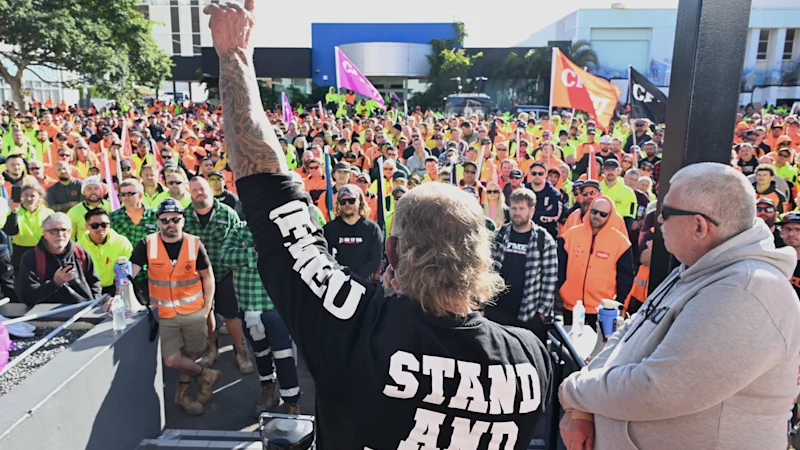
A leading workplace relations lawyer, Melbourne-based Wood represented Israel Folau in his 2019 legal battle with Rugby Australia over the termination of his contract, following the player’s comments that were widely seen as homophobic.
He was appointed a King’s Counsel in 2014 and is secretary of the Samuel Griffith Society, a conservative legal organisation founded to “defend and protect the present Constitution”.
Shortly after Wood was hand-picked by Deputy Premier Jarrod Bleijie to lead the inquiry, it emerged that he had donated $1500 to the LNP in 2023.
But in the inquiry’s first public hearing last month, Wood sought to assuage concerns of anti-union bias.
“Unions play a vital role in Australian society. The movement is recognised as playing a special role in keeping people safe,” he said.
Irving’s tenure has come with intense pressure. Months after taking the job, police warned him of credible intelligence of a threat to undermine his efforts to clean up the union.
Just last week, former CFMEU boss John Setka was charged with attempting to threaten or intimidate Irving.
Irving is a barrister who specialises in industrial, employment and antidiscrimation law.
He had previously acted for the Health Services Union to combat crooked union officials and recover funds stolen from union members.
Irving is scheduled to appear before the inquiry on Thursday.
Geoffrey Watson, SC
Watson is a director at the Centre For Public Integrity and an adjunct professor at the University of Notre Dame.Credit: Rob Homer
Watson is an anti-corruption expert, brought in by Irving to investigate allegations of violence in the Queensland operations of the CFMEU.
In a damning report handed down in July, Watson found the CFMEU had cultivated a culture of violence that included threats and intimidation of women and children.
It was that report that prompted Premier David Crisafulli to announce the commission of inquiry just days later.
In his opening remarks during the first public hearing last month, Wood said the Queensland inquiry would rely on the Watson report.
“Mr Watson observed that many victims likely remained silent, fearful of retribution,” the commissioner said.
Watson is a director at the Centre For Public Integrity and an adjunct professor at the University of Notre Dame.
He has acted as an adviser to federal, state and territory politicians on integrity and corruption issues and has represented asylum seekers pro bono.
Watson is scheduled to appear before the inquiry on Tuesday.
Michael Ravbar
Former state secretary Michael Ravbar led the move against the government’s intervention into the union.Credit: Matt Dennien
Ravbar is the ousted CFMEU Queensland secretary who, along with Jade Ingham, was found by Watson to have “embraced a culture which encouraged and celebrated the use of threats of violence, intimidation, misogyny and bullying.”.
Along with 270 officials across the country, Ravbar was removed from his role in August last year following the appointment of Irving as administrator.
Allegations against Ravbar, outlined in the Watson report, included that he berated a female public servant who was inside a locked room at CFMEU headquarters, causing her to fear physical violence and seek psychological help. Ravbar has denied that incident occurred.
“The problem starts with Michael Ravbar,” Watson found.
“He, like all Australians, enjoys a freedom of political communication, but that does not entitle him or anyone to engage in persistent, threatening abuse. His language set a low standard of conduct for the whole of the Queensland CFMEU. If the CFMEU was sliding into violence, the slide was starting from the top.”
Ravbar unsuccessfully challenged his removal in the High Court. He is not scheduled to give evidence in this week’s hearing block, but is on the commission’s list of people who may be required to appear.
Jade Ingham
Banned former CFMEU national president Jade Ingham with Cross River Rail workers during industrial action last year.Credit: Dan Peled
Formerly the CFMEU’s national president, the flatcap-wearing Ingham was one of the public faces of the ousted leadership, taking on media duties and revving up rallies to maintain the rage over the decision to put the union in administration.
With the exception of Ravbar, no union official has faced as much scrutiny over his role in the CFMEU’s alleged misconduct than Ingham.
In his report, Watson left no ambiguity about Ingham’s influence on the CFMEU.
“Several witnesses said that since the commencement of the administration the south-east Queensland construction sector has been peaceful or, at least, relatively peaceful.
“This cessation of violence demonstrates two important things. The first is that the CFMEU campaign was planned and controlled from the top: once Ravbar and Ingham were removed, the violence abated.
“The second is that the cessation of violence proves that the cycle of violence can be broken.”
Ingham is not scheduled to give evidence in this week’s hearing block.
Kane Lowth
Kane Lowth at the High Court of Australia, where he and Ravbar challenged the decision to put the CFMEU into administration.Credit: Alex Ellinghausen
Lowth was CFMEU assistant state secretary when he was among 21 union officials sacked after it went into administration.
Lower-profile than his comrades, the Watson report noted: “No adverse information was ever received in respect of Lowth.”
The Miles government removed Lowth from the board of QLeave as one of its final acts prior to going into caretaker mode, before it lost the state election to the Crisafulli-led LNP.
Along with Ingham and Ravbar, Lowth set up Your Union Your Choice in August last year, in response to the CFMEU being placed under administration.
Like Ravbar, Lowth was unsuccessful in his High Court bid against his ouster.
Lowth is not scheduled to give evidence in this week’s hearing block, but is on the commission’s list of people who may be required to appear.





